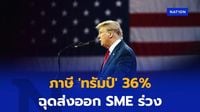In a significant shift in trade policy, former President Donald Trump announced a new reciprocal tariff system that will impose an astonishing 36% import tax on goods from Thailand, effective May 9, 2025. This announcement has sent shockwaves through Thailand's export sector, as the United States is the country's second-largest trading partner, accounting for a whopping 18.2% of Thailand's total export value in 2024, which amounted to 1.9 trillion baht.
The impact of the new tariffs is expected to be profound, particularly for the Thai export industry, which relies heavily on the U.S. market. In 2024, Thailand exported goods worth approximately 1,928,483.71 million baht to the U.S., with the electronics and technology sectors being among the most affected. These sectors alone contribute over 30% of total exports to the U.S., and the new tariffs threaten to cripple their competitiveness.
According to Mr. Chookiat Ophaswongse, Honorary President of the Thai Rice Exporters Association, the anticipated 37% tariff on Thai jasmine rice is particularly alarming. He noted that this could drastically increase the price of Thai rice from around 900–1,000 dollars per ton to 1,400 dollars per ton, making it significantly less competitive compared to Vietnamese rice, which, despite facing a 46% tariff, sells for only 600–700 dollars per ton.
"If the Thai government does not expedite trade negotiations to reduce tariffs or find ways to assist exporters, we may soon lose our market share in the jasmine rice segment to Vietnam," warned Mr. Ophaswongse. This sentiment is echoed by the Ministry of Commerce, which estimates that the new tariff could impact Thai exports by as much as 880 billion baht.
The Thai government is aware of the impending crisis and has already initiated discussions to mitigate the effects of these tariffs. Mr. Pichai Naripthapand, the Minister of Commerce, emphasized the importance of negotiating with the U.S. to lower the tariffs, stating, "We are prepared to use all diplomatic and trade channels to request exemptions on certain items."
Furthermore, the Thai Chamber of Commerce has urged the government to consider the 15 exported products that are most vulnerable to the new tariffs. These products, which account for over 60% of the total export value from Thailand to the U.S., include mobile phones, electronic components, tires, semiconductors, transformers, and more.
Mr. Thanagorn Kijsuwannarat, President of the Thai Textile Industry Association, expressed concern about the impact of the tariffs on the textile and automotive sectors, which could face a 25% import tax in addition to the reciprocal tariffs. He stated, "The increase in tariffs is higher than we anticipated and will certainly affect our export volumes. We are currently assessing the potential damage across various sectors, and we expect to have clearer estimates by May."
The situation is further complicated by the geopolitical landscape, including ongoing conflicts in regions like Ukraine and the Middle East, which could exacerbate the global economic slowdown. The Thai government is also grappling with fluctuating currency values, which add another layer of uncertainty to trade negotiations.
In light of these challenges, the Thai government has proposed several measures to counteract the negative effects of the tariffs. These include promoting trade by reducing logistics costs, utilizing free trade agreements (FTAs) with other partner countries, and reforming domestic laws to facilitate imports from the U.S.
Moreover, the Federation of Thai Industries (F.T.I.) has highlighted the need for a comprehensive approach to trade negotiations, suggesting that Thailand should focus on increasing imports of agricultural products from the U.S. to balance trade relations. This strategy aims to not only mitigate the impact of the new tariffs but also strengthen bilateral ties.
As the Thai government prepares to tackle these challenges, the small and medium-sized enterprise (SME) sector is particularly vulnerable. SMEs accounted for 14% of Thailand's exports to the U.S. in 2024, with a total value of 7,634 million dollars. The SRT estimates that exports from SMEs could decline by 1,128 million dollars, or approximately 38,300 million baht, in 2025 due to the tariff increases.
Key sectors expected to be severely impacted include electrical appliances, machinery, gems, and plastics, which collectively represent 75% of all SME exports to the U.S. The SRT has identified 12 main categories of goods that will be significantly affected, with approximately 3,700 SMEs relying heavily on exports to the U.S.
As Thailand navigates this turbulent trade landscape, industry leaders are calling for immediate action. Mr. Kriengkrai Thiennukul, Chairman of the F.T.I., has convened meetings with various industrial groups to devise strategies to mitigate the fallout from the new tariffs. He stated, "We must work together as a country to address these challenges and protect our industries from the adverse effects of U.S. trade policy."
The next few months will be critical for Thailand as it seeks to renegotiate its trade terms with the U.S. and safeguard its export markets. The outcome of these negotiations will not only determine the fate of Thai exporters but could also have broader implications for the country's economic stability.








